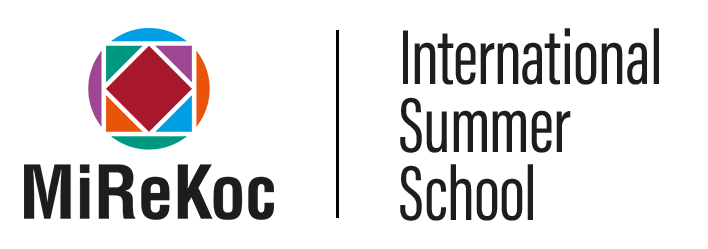MiReKoc Summer School 2017 brought together lectures by a distinguished international faculty, including Maurice Crul (Free University of Amsterdam), Pınar Uyan Semerci (Bilgi University), Mechtild Gomolla (Helmut Schmidt Universitat), Elzbieta Gozdziak (Georgetown University), Franck Duvell (University of Oxford), Mechtild Gomolla (Universidad der Bundeswehr Hamburg), Nihad Bunar (Stockholm University), Sabine Strasser (Universitat Bern), Bahija Jamal (Hassan II University) and Sütay Yavuz (TODAIE, Ankara), with Ahmet İçduygu, Çetin Çelik, Doğuş Şimşek, Nathan Bertelsen and Aylin Küntay from Koç University.
In fact, thankful–thank you is not enough for this summer school. I greatly appreciate the efforts to organize the workshop. We felt as if we were at home. It was greatly [well] organized, and we get benefit [benefited] from all the activities and effort done during this summer school. Thank you.
Mustafa Al-Asaad, Syria
The summer school is really very very interesting because, I’ve been working on migration and development issues and trafficking issues, and other related stuff for the past fifteen years, but this is the first time I’ve attended a training–a very comprehensive one–that has to do with refugees, on displaced people, and it’s right smack in the middle of where the situation is really happening which is in Istanbul where there are many participants who are actually experiencing that situation. It is very good that the summer school is actually able to generate response and participation from them. So I’ve gotten to really know what is the real situation. So I think (as I have said on many of the discussions on the side) the international conventions and the laws that we have should to work further for the benefit of people who are really affected by crisis, by the refugee situation. The global compact on migration, which is supposedly for that purpose, should do better for these people. So, this is an eyeopener, a good one that I’ve been able to encounter a lot of the people that are going to be affected and it will be very very interesting background in upcoming work that I will be doing. So thanks very much.
Golda Myra Roma, Philippines
I think all of us really learned a lot with this program and we are a really diverse group–scholars, but especially also those working in the field and for NGOs. I think also it was be interesting to see that although we were coming from different parts and different fields, that we had a common language, a common understanding, common problems we are facing, and common solutions I think. I think we should talk more about–a lot of people talk about cultural differences–but we should more talk about cultural similarities and cultural encounters. I think that was also what I learned here. So thank you very much.
Claudius Ströhle, Austria
It was a really precious experience for me. I have learned a lot. I have met new people. It was really important stuff for me to take because we learned a lot of stuff we can have to practice in our daily lives in the field working with refugees and also especially with children and everything related to immigration. So, it was a great opportunity for us. Thank you MiReKoc for doing such a huge step because all these researchers are very valuable to people’s lives. Hopefully we can do something good for them. Thank you.
Nour Elmeddah, Syria
MireKoc Summer School was very enriching that I could find the opportunity to catch up with the latest discussions about migration and children. Apart from its contribution to theoretical knowledge, field trips helped me a lot to learn more about which actors are involved in the integration processes of different migrant groups and how they respond to the needs of them. On top of them, organization team was very friendly, helpful and extremely responsive.
Deniz Yıldırım, Türkiye


